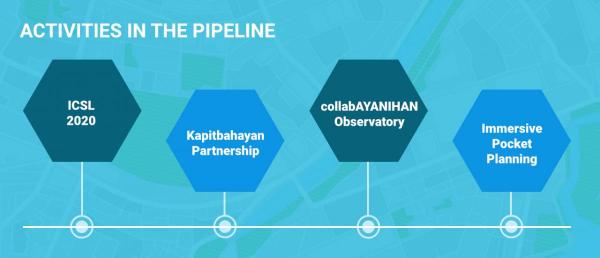CeNS
Inspired by its ‘mother’ Centre, the GCRF-funded ‘Centre Sustainable, Healthy and Learning Cities and Neighbourhoods (SHLC)’, ‘CeNS’ is an independent non-government, non-profit research and technology organisation that promotes, develops, and enhances research and development, capacity, and partnership-building in environmental and neighbourhood planning and other related fields of endeavour to achieve a smarter and sustainable neighbourhood. With the neighbourhoods as its key focus, CeNS began with the aim of bridging the gap between communities and higher levels of government.
The Centre establishes itself to be “The premier institution on neighbourhood science engaged in research and development, capacity enhancement, and partnership-building towards the sustainable transformation of neighbourhoods.” CeNS is backstopped by transdisciplinary professionals with a combination of knowledge and unique planning experience developed through years of research, teaching, training, and actual professional practice.
In bringing their focus down to the neighbourhood, the members envision “inclusive, resilient, and sustainable neighbourhoods of healthy and learning people who have equitable access to quality basic services, adequate economic opportunities, appropriate infrastructure, and who nurture a balanced ecology, a sense of community, and partnerships for development.” CeNS promotes strategic collaboration where neighbourhoods co-create and share neighbourhood science, knowledge, and innovations.
The Centre has been working and implementing projects in the City of Manila, Batangas City, and Valenzuela City.
As an advocate of collaborative learning, the Centre regularly holds Talakalayaan. The word Talakalayaan is a play of Filipino words “talakay” and “kalayaan”. “Talakay” in English means discussion or dialogue while “kalayaan” is a Filipino word for “liberty” or “freedom”. Talakalayaan provides a platform of knowledge prototyping, collaborative-creation, and knowledge-sharing where the Centre’s members, partners, and stakeholders freely discuss and develop impactful studies and social innovations. It creates space where urban problems and challenges are explored and reframed from a human-centred perspective and solutions collaboratively developed through innovation.
Its projects and activities related to learning cities that are planned to be implemented in the coming years include:
- The International Conference on Sustainable Living which, among others, aims to contribute to evidence-based policy-making and practice on formal education and non-formal community-based learning towards economic prosperity, well-being, and cultural and social development in urban settings;
- The CollaBAYANIHAN project promotes inclusive and collaborative learning among its stakeholders to be engaged in urban development, sustainability and neighbourhood sciences through processing big and spatial data into multi-media content understandable for the audience.
- The Kapitbahayan Interactive Session, a virtual resident-led tour of neighbourhoods locating the kapitbahayan (Filipino terms for the neighbourhood) partners at the forefront of neighbourhood science.
Email: [email protected]
Website: https://cens.ph
Twitter: @cens_ph



